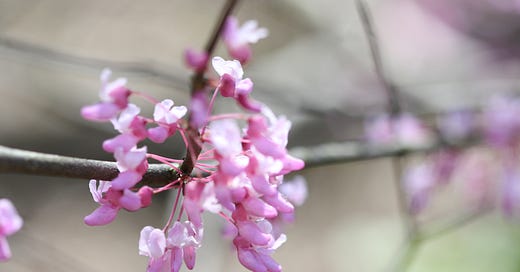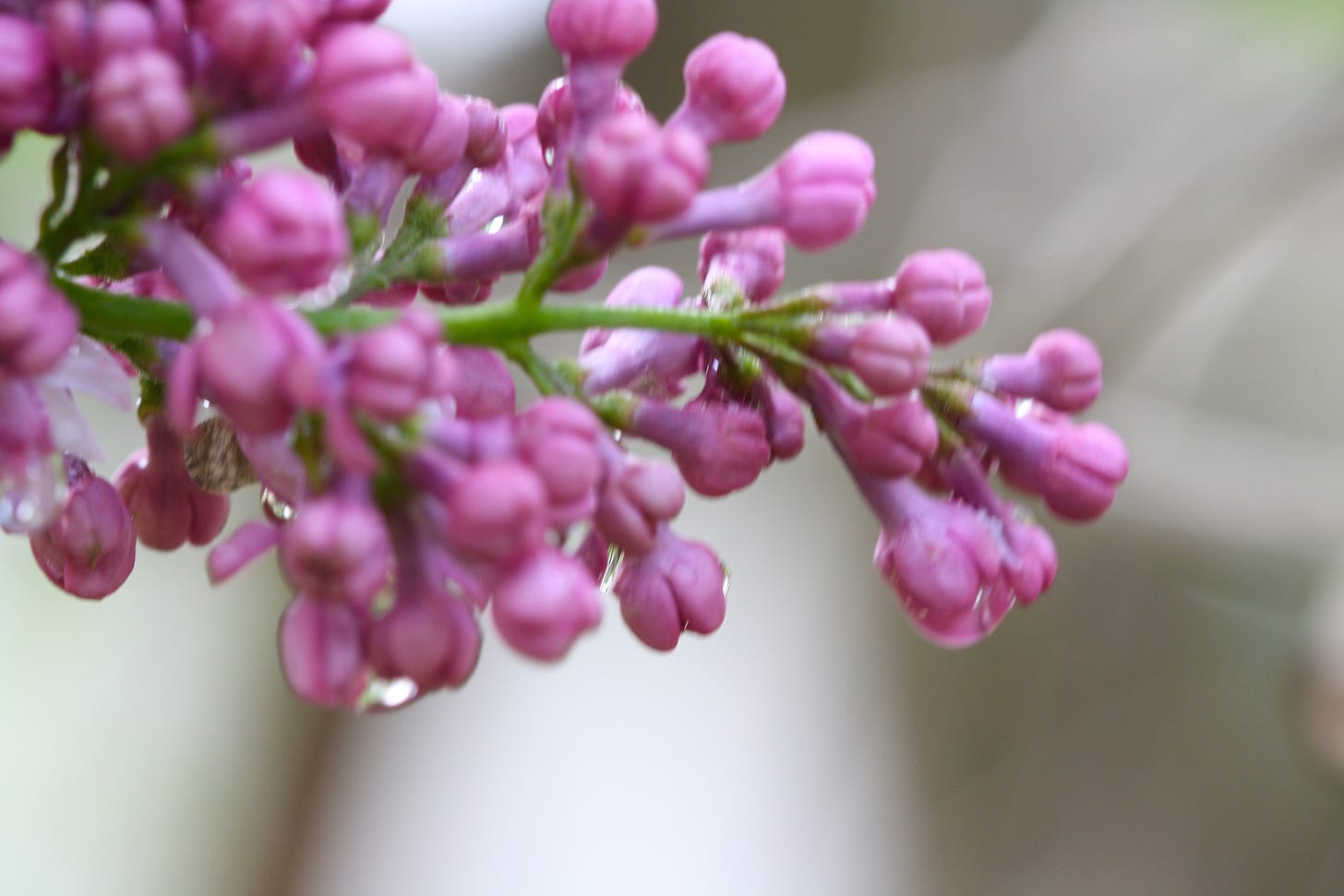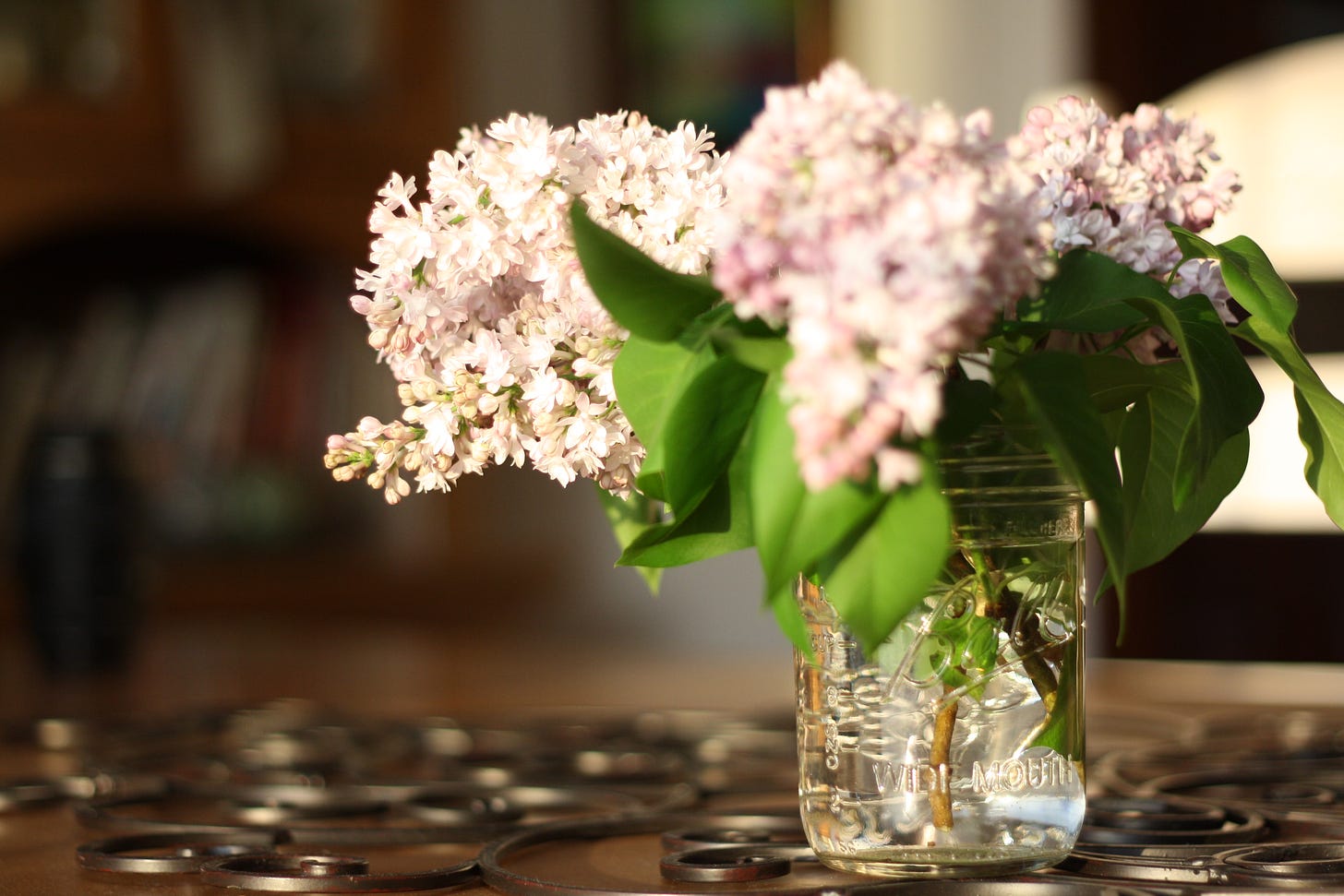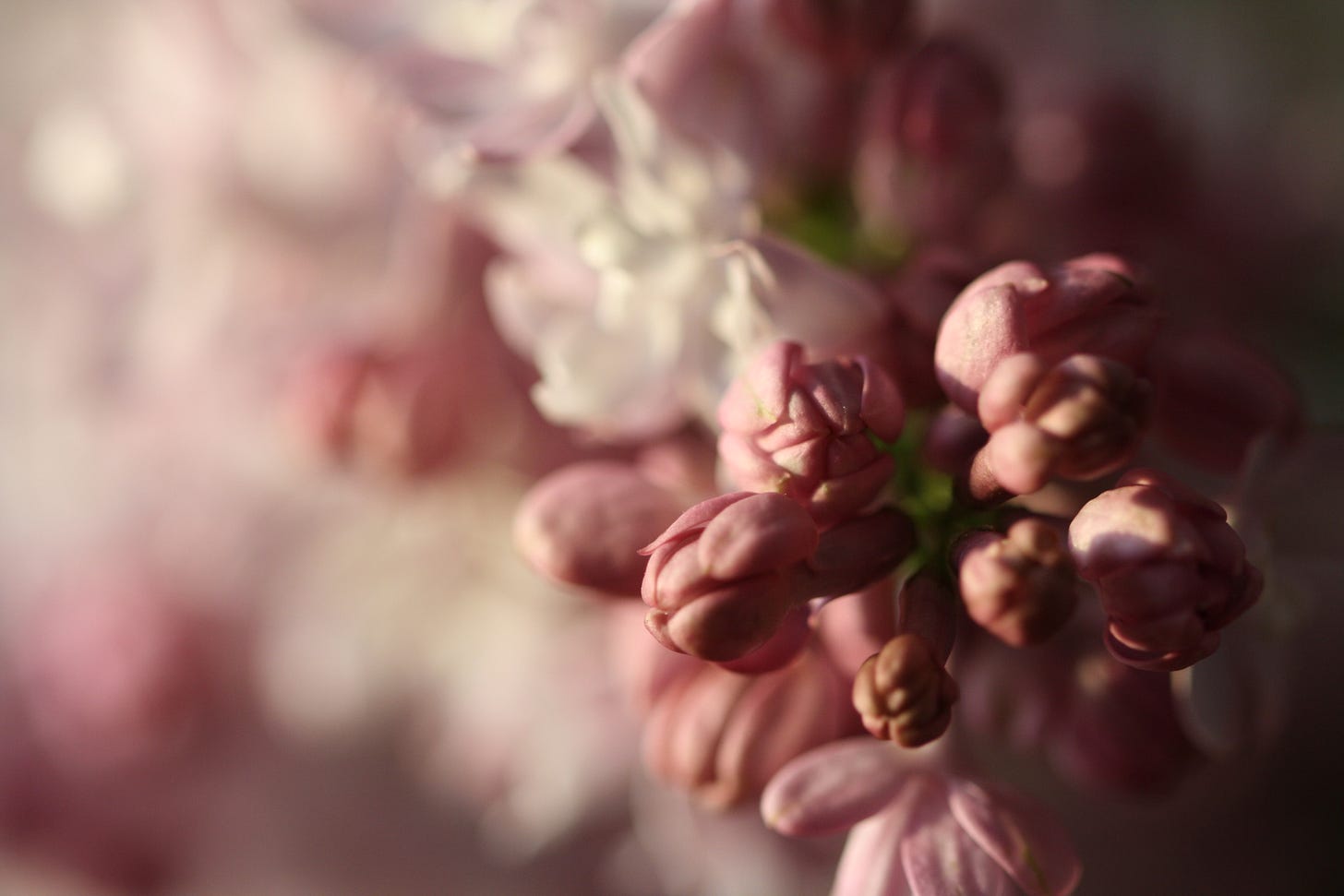To listen to today’s post:
“God writes the Gospel not in the Bible alone, but also on trees, and in the flowers and clouds and stars.” ~ Martin Luther
I arrived home from Bluefield this weekend to find my lilac bush in full bloom. Before I even unpacked, I slipped off my shoes and went outside barefoot to meet each blossom personally. I could smell the sweet, spicy aroma of those purple blossoms as soon as I opened the door. I drew close, pressed my nose against the full impact of the scent.
The writer’s conference I attended over the weekend created a little pre-conference Facebook group so all the attendees could mingle prior to arrival. Someone commented they were looking forward to driving through West Virginia in the spring. “The redbud is blooming,” I commented in response. And it was, the brilliant magenta peeking out through trees laced with green all along the highways. West Virginia in the spring is a thing of such aching beauty. I say “aching” because that beauty often exists side-by-side with the not-so-beautiful. Poverty and loss echo across these hills too. The Appalachian culture is one that often mystifies outsiders. How does one explain the strange mountain ways that are a part of the DNA of anyone who has grown up walking these hills and valleys?
“Are all the roads in West Virginia like that?” One dear person asked me.
“What do you mean?” I asked. “A trailer park next to a rusted-out automobile next to nothing in the middle of nowhere?”
“Yes,” she said, smiling, nose crinkled just ever so slightly.
“Honestly,” I said, “it’s like that everywhere in Appalachia.”
I chuckled with her a little bit at it all, for, am I not also a person of privilege? But I am familiar with the contradictions of these windy, turny roads.
My mother’s father was a coal miner—a hard-drinking man with rough hands who laughed easily and loved children. Mining was hard work, and sometimes dangerous, but it paid a fair wage. That was something a man with little education and a growing family in rural West Virginia could appreciate. His daddy farmed to feed his family; now that same land would give provision in a different way.
For my grandfather, this land where I now live was about more than making a living. It was a way of life. A way of life that has been slowly seeping away.
Our culture, our ways, have been defined by the landscape. Through the long years of history, the isolation and adversity of rural, mountain living created a people deeply rooted in land and family, highly suspicious of outsiders who were more than happy to exploit these simple people and lay claim to the wealth of timber and coal once abundant in these hills. When the resources disappeared, so did the revenue strains, leaving behind a broken and impoverished people.
Mechanization in the 1950s and 60s changed the face of coal mining and most blue-collar work all across Appalachia. Thousands of miners lost their jobs and left the region.
My grandfather stayed.
As the economy and industry shifted, the population declined further in the 1980s. Once-thriving communities became ghost towns as young families left in search of livelihood.
Bodies broken from years of hard labor became dependent on prescriptions to get through the day. Others self-medicated to forget the pain in their bodies and the emptiness of unemployment.
Gradually, the way of life the land gave us began to fade from our memories. Hollows once blossoming with carefully tended homes and gardens became darker places. Lonely places. Forgotten houses and rusted out automobiles left behind.
A few years ago I attended a work in-service on Appalachian culture. Did you know West Virginia is the only state that is entirely within the Appalachian region? Our instructor talked about the unique characteristics of folks who live in these hills. One thing she told us was that people from Appalachia are fatalistic. That means that sometimes we believe it doesn’t matter what we do, things are going to turn out the way they’re going to turn out. This can make it challenging to encourage folks to adopt new habits and healthier ways of life. This is probably one reason West Virginia has high rates of obesity and heart disease, one reason we have trouble imagining a new way of life when the old one goes away.
The theme of the writing conference last weekend was “Writing from the In-Between Places.” We heard from such luminaries as Dr. Justo Gonzalez, Daniel Nayeri, and Mitali Perkins. These generous writers and speakers shared their stories of bridging the cultures of their birth and the one in which they now live. Their stories were beautiful and inspiring and the lessons they have carried with them through the in-betweens gave them a unique perspective and a resiliency that showed in their bearing. As we gathered in the recently restored Granada Theater, outside an old Montgomery Ward building stood in ruins, undergoing demolition. Street after street of abandoned buildings stood in silent sentinel.
The redbud blooming beside a dilapidated and forgotten house. A former coal-mining town welcoming writers from all over the country. An old department store building being demolished to make room for a new park.
The beautiful and the not-so-beautiful, standing side-by-side. This feels like an in-between to me.
I’ve been thinking about what the opposite of fatalistic might mean. Dictionary.com tells me antonyms for the word are cheerful, encouraged, optimistic, joyful... but none of those quite ring true. Appalachian folks are some of the most joyful people I know. I think what makes it hard for us to change our ways is the deep attachment we have to traditions, to people, to the land. That is mostly a beautiful thing. But sometimes, life requires a shift.
Perhaps the opposite of fatalistic looks like creating new traditions when seasons of life come and go. Today, I’ve been snipping lilac blossoms for the table. I have haunted the kitchen window to watch a pair of Carolina chickadees explore the nesting box in the back yard. I’m dreaming about attending this same writer’s conference next year.
I don’t know if these things can be new traditions, but they made the day feel less lonely. I ponder these thoughts as I take Bonnie out for a walk.
I think of my grandfather as I walk beside the creek with Bonnie. I don’t know what it was about this land that fed his soul. The curves of these hills move differently inside of me. As I watch the wind blow maple samaras all over the street, I wonder if Grandpa’s loyalty was not so much to the work of the land as it was to the slow pace of life this land engenders. To family and the deep relationships that grow in these hills.
I gaze down at swift-moving water slipping over smooth stones and wonder if my grandfather knew that his choice to stay would bring me where I am today … walking the streets of a neighborhood that stands on a former cow pasture.
Home.
portions of this essay were first printed at TheHighCalling.org, now Theology of Work.









Listening to you narrate your post my mind filled with the scent of lilacs...your words transport and it is a delight to savor what you share🌱
Beautiful, as always, Laura. I always hang on every word you write/speak. I think I've mentioned it before, but a couple of years ago we drove from a wedding Philadelphia to our son's home in Louisiana, and my favorite state to drive through was West Virginia. I wish we had not been in such a hurry to get to Louisiana. I wanted to spend more time along the side of the road, gazing at the beauty and imagining life - the good and not so good - in those rural mountains.